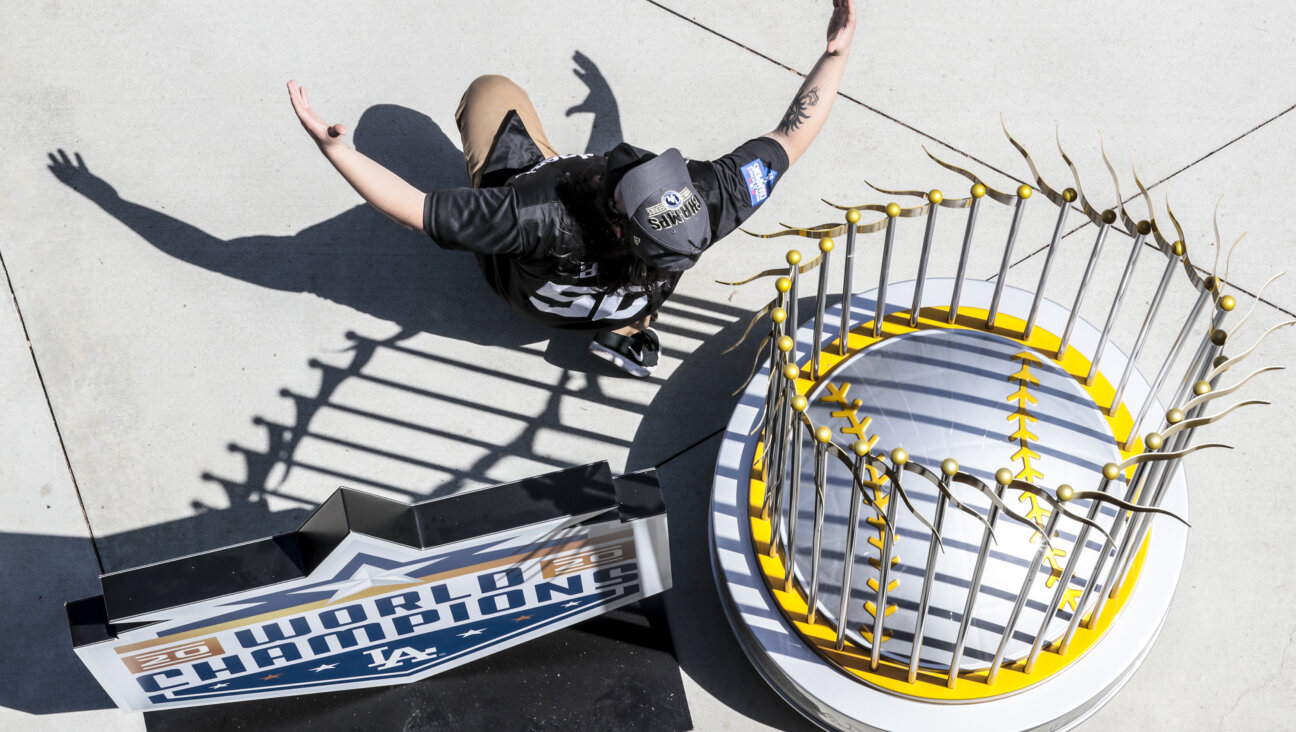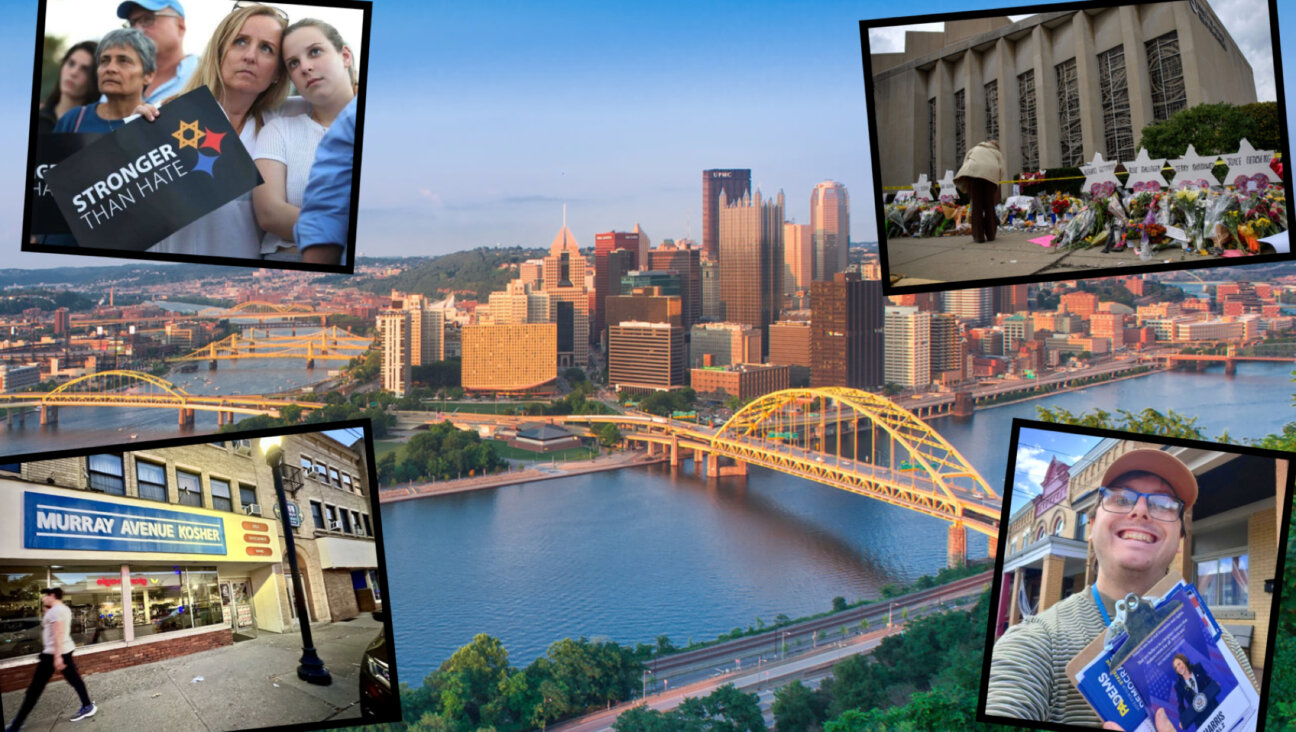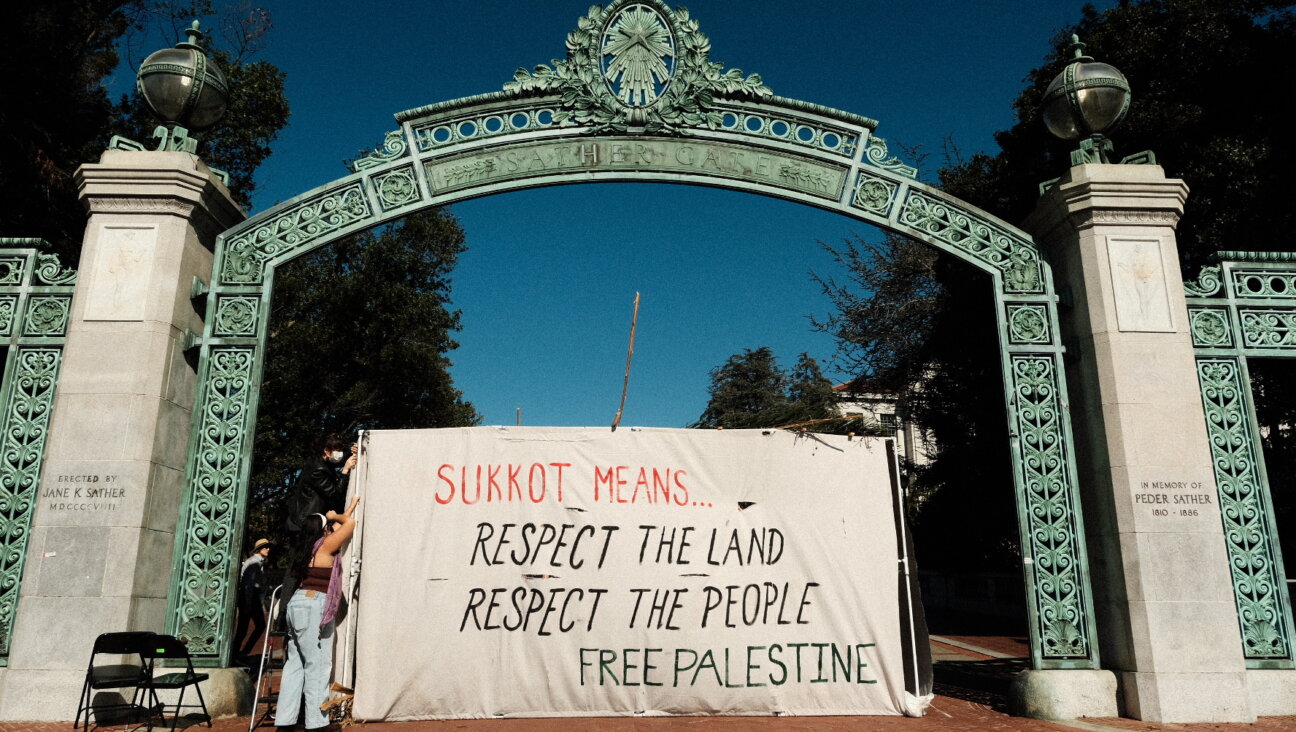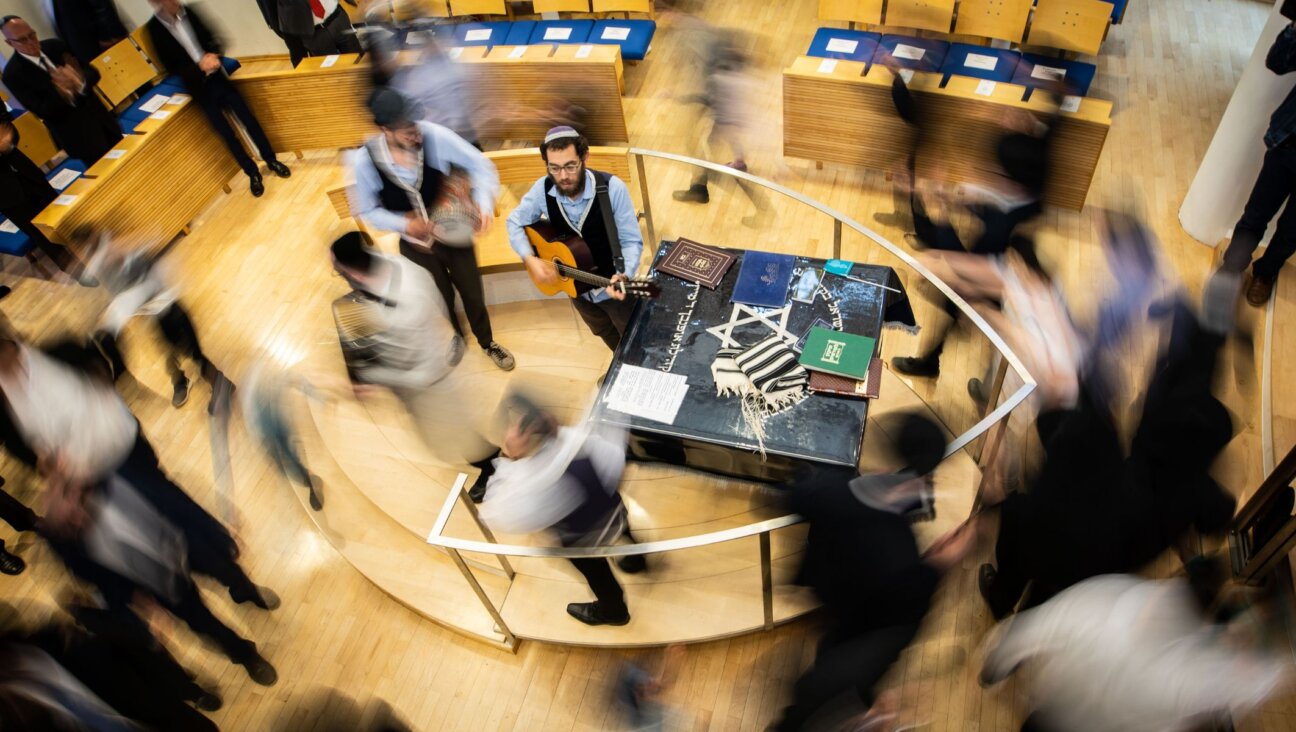This support group for Israeli expats in New York offers Hebrew and hugs
One year into its existence, the Israeli Hug Center has evolved into a full-fledged organization with three staffers
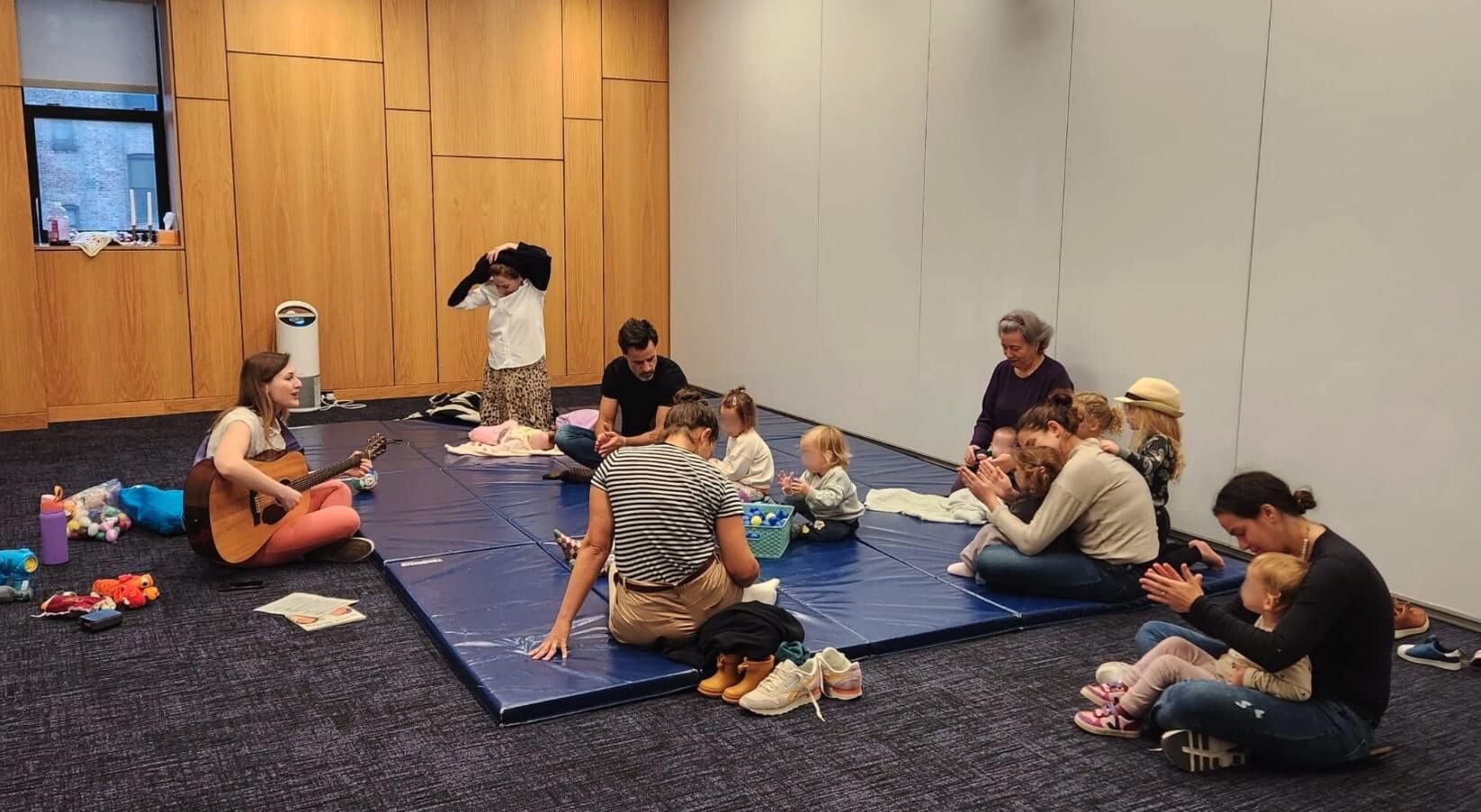
A children’s group plays at the Israeli Hug Center at New York’s Congregation Rodeph Sholom. Courtesy of Scott Hertz
(New York Jewish Week) — The sound of a dozen phones buzzing repeatedly isn’t a given at the weekly meetings that Erela Nornberg organizes for Israeli expats in New York.
But last Tuesday at 1 p.m., Iran had just launched nearly 200 ballistic missiles into Israel, and the Israeli support group she works with on New York’s Upper West Side was unusually on edge. Participants were getting calls and texts from loved ones back home, or watching their rocket alert apps go off.
Nornberg, whose day job is a child welfare social worker, launched the Israeli Hug Center just days after the Oct. 7 Hamas attacks in Israel last year. The name, she said, is representative of the feeling Nornberg wants its members to have.
“We hugged all Israelis who arrived to NYC after Oct. 7,” she told the New York Jewish Week. “It’s a warm environment where you can feel at home.”
Initially founded to provide immediate relief for Israeli families arriving to the New York area after the Hamas invasion, one year into its existence the Israeli Hug Center has evolved into an full-fledged organization with three staffers, two of whom are paid. These days the Hug Center, which is based at Congregation Rodeph Sholom, a Reform synagogue on West 84th Street, provides robust programming for around 300 Israeli families living in New York City. Its offerings include a support group for mothers and babies, group sessions with a therapist for those affected by the war, lectures on being an Israeli parent in New York, a Hebrew music group and more.
During the New York Jewish Week’s visit last week, about a dozen members of the group discussed how the Iranian missile attack acutely reminded them of Oct. 7, 2023, when they were constantly on their phones, waiting anxiously to hear news from their loved ones. And though Israeli officials ultimately only reported one death from the Iranian strike — a Palestinian man near Jericho — the sense of anxiety in the building’s chapel, where the group convenes, was palpable, as was the sense of comfort everyone in the room derived from being around fellow Israelis.
“When I walked in here with my three children, I didn’t feel any of that chaos of not knowing,” Gal Kessel, one of the group members, said of her first encounter with the Hug Center. “I came in and it just felt like a warm hug and if I need to go to a corner to cry for a second, I can.”
Kessel added, beginning to cry, “Erela came in with a notebook and asked, ‘what do you need?’ It changed how we were able to deal with the first month.”
Nornberg, who is herself Israeli, raised her three children, now young adults, in New York and sent them to Rodeph Sholom’s day school — which is why she approached the Reform congregation to host the group. Initially funded with UJA emergency funds for displaced Israeli families, the Hug Center now takes donations and is currently supported by Rodeph Sholom.
“This is really part of our DNA and who we are at Rodeph Sholom,” Barbara Zakin, executive director of the synagogue, told the New York Jewish Week, adding that approximately 11 Israeli families who have relocated to the area are enrolled at the school for this year. “We consider ourselves a haven and a community and a place where people can feel safe — emotionally safe and physically safe.”
Now, after 12 months helping Israeli expats adjust to life in New York City following the outbreak of the war, the Hug Center is pivoting once again — this time to connecting its members with American Jews.
Through a partnership with the nearby Marlene Meyerson Jewish Community Center and the Jewish Agency for Israel, the Hug Center is facilitating events around different subjects between Israeli and Jewish American women, including a baking event and an upcoming lecture by a former hostage that is open to the community.
“I feel like I’m translating — instead of language, translating culture,” Nornberg said.
Adaptation to life in the United States has also led to a slight shift in the Israelis’ understanding of what it means to be Jewish.
“For me, my Jewish identity and my Israeli identity are intertwined, so it’s really hard to separate,” said Rotem, who declined to give her last name. “It was important to choose a school for my daughter that’s Jewish. We decided to have another child, because we need to maintain Jewishness going on in the world. It [Oct. 7] didn’t push us to be more religious, but pushed us to be more aware of our Jewishness in our community.”
Kessel said going to meetings inside Congregation Rodeph Sholom has brought her Israeli and Jewish identities closer together.
“In Israel we were not religious, at all,” Kessel said. “If I would tell my husband we’re going now to a congregation or a synagogue, he would look at me like I’m crazy. But then when you do walk in and you feel the hug, and the feeling of family and connection that feels so similar in a place that’s so not similar to what we’re used to — it becomes so much more than just a religion.”
But for many of those who frequent the Israeli Hug Center, it’s still a place to just be with other Israelis. Kessel, who moved to New York almost immediately after last Oct. 7, recalled that the noise and sirens of the city were particularly triggering. “Then you arrive to 84th [Street] and you walk in and everyone is in the same exact place as you.”
Talking with a reporter over bourekas and salad from Breads Bakery, an Israeli-founded chain, a few Hug Center members recalled how, over the winter, the mother of a recently arrived family needed a warm coat — and the group was quickly able to get her one.
Sometimes, however, there’s a disparity between what Israelis actually need and what their American counterparts think they need. One Hug Center member who asked not to be named recalled someone offering 200 used sleeping bags.
“Do you remember when someone kept on giving us muffins or croissants?” Lisa Schiff, director of the congregation’s early childhood education programming, asked the room. Referencing an Israeli breakfast staple, she exclaimed, “We need cucumbers!”
For Ilit Sheba, who has lived in New York for the past two years and was pregnant with her now-six-month-old son last Oct. 7, the chance to surround herself with Hebrew speakers has been a huge opportunity to express herself fully.
“Being with other Israelis, especially the last year, it’s the closest to family that I have here,” she told the New York Jewish Week on Monday, following the screening of a Tel Aviv ceremony commemorating that day’s one-year anniversary of the Oct. 7 attacks.
“It was much better than being alone,” Sheba said of watching the ceremony in community with other Israeli expats. “I was thinking a lot, to come here or not, and eventually I figured it’s gonna be better to cry together with everybody than to just sit home alone and cry with a baby.”
Sheba, like several other parents, brought her baby to the screening, which approximately 250 people had signed up to attend. Nearly all in attendance were fluent Hebrew speakers.
“That’s what makes you feel home, it’s the language,” said Maya Lev Miller, a social worker and one of the three Israeli staff members who run the Hug Center.
Nornberg, meanwhile, is optimistic that no matter what happens with the war between Israel and its adversaries, the Hug Center can continue to provide support for the Israeli community in New York City into the future.
“It all started with a terrible, dark day, but hopefully this will stay here for the next generation,” she said.
A message from our Publisher & CEO Rachel Fishman Feddersen

I hope you appreciated this article. Before you go, I’d like to ask you to please support the Forward’s award-winning, nonprofit journalism so that we can be prepared for whatever news 2025 brings.
At a time when other newsrooms are closing or cutting back, the Forward has removed its paywall and invested additional resources to report on the ground from Israel and around the U.S. on the impact of the war, rising antisemitism and polarized discourse.
Readers like you make it all possible. Support our work by becoming a Forward Member and connect with our journalism and your community.
— Rachel Fishman Feddersen, Publisher and CEO







